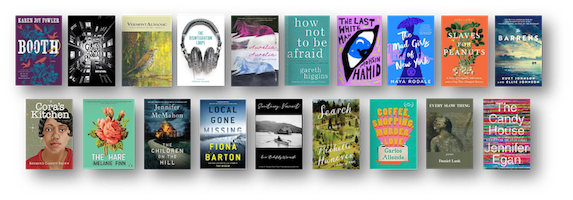
A writing podcast for writers and curious readers, featuring interviews with authors, poets, agents and editors. Twice chosen as one of Writer’s Digest Magazine’s 101 Best Website for Writers. Vermont-grown.
A writing podcast for writers and curious readers, featuring interviews with authors, poets, agents and editors. Twice chosen as one of Writer’s Digest Magazine’s 101 Best Website for Writers. Vermont-grown.
Episodes

Tuesday Dec 22, 2009
Write The Book #77 (12/21/09) Diane Imrie & Richard Jarmusz
Tuesday Dec 22, 2009
Tuesday Dec 22, 2009
Interview with Diane Imrie and Richard Jarmusz, co-authors of the new cookbook, Cooking Close To Home, and co-workers within Burlington, VT's Fletcher Allen Health Care Department of Nutrition Services. Prompt: This week's Write The Book Prompt was inspired by my guests, Diane Imrie and Richard Jarmusz. Their cookbook, Cooking Close To Home, has a focus on harvesting local foods. Richard says that, "Life is a harvest of good local foods." In keeping with this theme, today's prompt has to do, metaphorically, with harvesting that which we have, rather than looking far and wide to import experience into our writing. This week, write something from your own life experience. Even if your primary genre is fiction, pull something from your life, disguise it, and bring it into your work. Here are three ideas to get you started:
- Write about a favorite teacher. Focus on setting as you write about being in his or her classroom.
- Write about your first best friend. Include sounds and smells as you write about this friendship.
- Write about a terrible vacation experience. Complicate what you write by including the one good thing that happened on the trip.

Tuesday Dec 15, 2009
Write The Book #76 (12/14/09) Deborah S. Schapiro
Tuesday Dec 15, 2009
Tuesday Dec 15, 2009
Interview with Deborah S. Schapiro, editor of the Vermont publication Edible Green Mountains. Prompt: Deborah Schapiro actually recommended two Write The Book Prompts for listeners.
1) Your first prompt this week has to do with recipes. Look at recipes and notice how they're written. You can look in cookbooks, magazines, your own index card file. Notice actual differences in recipes' structure and try to understand what the cooks who wrote them were focused on: ease of use, quick communication, tips for success? Did your grandmother guess at average quantities, or did she keep to very specific measurements? Does a certain famous chef suggest where you might find little-known ingredients? Does your favorite cookbook offer variations or keep to a set script? Some recipes are copied down as simple paragraphs, with ingredients embedded in the text. In others, ingredients are offered up front. Some are written in two columns, with ingredients on the left and instructions on the right. Edible Green Mountains delineates each step with a new paragraph indent, in hopes of keeping things simple.
After you study a few recipes, write a scene or a poem that attempts to emulate something about a recipe you've found. Then write it again, using another style of recipe for inspiration. What differs in your final products? Which do you prefer and why?
2) The second prompt suggested by Deborah also has two parts. First, consider a food memory. When Deborah was small, she would occasionally come home from school to find her mother in the kitchen making a Hungarian biscotti-like cookie. She recalls the warming scent of cinnamon, the crunch of cinnamon and sugar on top of the finished cookies. The glass of milk. All of these sensory memories evoke strong emotions for her as she thinks back.
Once you've identified a food memory of your own, consider a food-related poem or scene that moved you in a work of literature. Blueberries, by Robert Frost. Proust's famous madeleines. Just about every chapter in Like Water For Chocolate. Why did the scene or poem affect you as it did? If you were to try and write a food scene or poem of your own, what might you have learned from this work of literature that would help you? Now try to write about your food memory.
Good luck with these exercises and please listen next week for another. Music credits: 1) “Dreaming 1″ - John Fink; 2) “Filter” - Dorset Greens (a Vermont band featuring several South Burlington High School students)
Monday Dec 07, 2009
Write The Book #75 (12/7/09) Charles Harper Webb
Monday Dec 07, 2009
Monday Dec 07, 2009
Interview with the poet Charles Harper Webb, author of the new collection Shadow Ball, published by the University of Pittsburgh Press. Prompt: Today's Write The Book Prompt was suggested by my guest, Charles Harper Webb. Charles recently published this prompt and one or two others in a collection titled The Working Poet, published by Autumn House Press and edited by Scott Minar.
Choose two subjects that interest you - the more different and apparently unrelated, the better. You may choose two stories, two processes (making beer, lethal injections), a story and a process, whatever. The important thing is that both subjects be of real interest to you. Now write a poem in which you combine the two subjects, letting each intermingle with and illuminate the other. Ideally, you will have no idea how the two interconnect until - it may seem like magic - they do.
Good luck with this prompt, and please listen next week for another. The poems from the book Shadow Ball: New and Selected Poems, by Charles Harper Webb, ©2009, are aired/posted by permission of the University of Pittsburgh Press. Music credits: 1) “Dreaming 1″ - John Fink; 2) “Filter” - Dorset Greens (a Vermont band featuring several South Burlington High School students)
Friday Dec 04, 2009
Write The Book #74 (11/30/09) Scott Russell Sanders, Part 2
Friday Dec 04, 2009
Friday Dec 04, 2009
Interview with Scott Russell Sanders, author of twenty books of fiction and nonfiction. His latest is A Conservationist Manifesto, published by Indiana University Press. Prompt: Today's Write The Book Prompt was suggested by my guest, Scott Russell Sanders, who is a writing teacher as well as a writer. Think about the classic elements as the Greeks imagined them: air, earth, fire and water. Say the words over and over in your mind. Settle on one of them. And then begin to think about what associations you have in your own life with that element. Water can be ice, moving water, a pond, something you drink, snow, mist, clouds. You could think about a place where you encountered water in some foundational way: where you learned to swim or a snowstorm you got caught in in your car once, or sledding down a hill as a child. Write a list - not a narrative - of these associations or memories: sledding, ice fishing, snowball fights. Pick one or two of these items from your list and then begin to write, begin to unpack it, see where it goes. Good luck with this prompt, and please listen next week for another. Music credits: 1) “Dreaming 1″ - John Fink; 2) “Filter” - Dorset Greens (a Vermont band featuring several South Burlington High School students)
